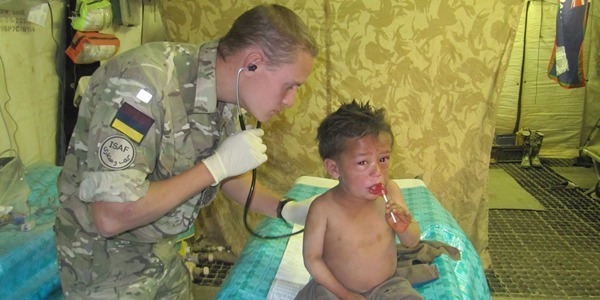A military doctor serving in battle-scarred Afghanistan has spoken of his experiences on the front line treating everything from gun shot wounds and trauma injuries to blisters and coughs.
Captain Christopher Stewart, from Meigle, is at a patrol base in the Nad-e Ali area of war-torn Helmand province.
As well as treating allied casualties, Capt Stewart told of his daily battle to care for Afghans including an eight-year-old girl who was critically wounded by an insurgent’s wayward bullet.
A doctor with the British Army’s 16 Medical Regiment, the 26-year-old is living and working alongside troops from 1st Battalion The Royal Irish Regiment.
Operating out of tents at the patrol base, Capt Stewart’s primary role is to look after the health needs of the soldiers, ensuring they are “fighting fit” and operationally effective at all times.
Troops can expect the same level of medical care on the front line as they receive back in the UK. However, there are countless challenges, one of them being the extreme weather. Contrary to popular belief, it is not always hot in the desert, and winter has reached Afghanistan too.
With sub-zero temperatures at night and scorching heat of the midday sun, a substantial proportion of Capt Stewart’s job is ensuring preventative measures are in place to safeguard against injuries from such conditions. Frostbite and heatstroke can be witnessed in the same 24 hours.
However, Capt Stewart is also constantly on high readiness to receive trauma casualties resulting from roadside bombs and gun attacks.Local roleAs well as providing potentially life-saving medical care for soldiers, British Army doctors treat Afghan locals requiring emergency care for life, limb or eyesight related injuries.
In his time in Helmand, Capt Stewart has treated a number of Afghan children and adults who have suffered injuries as a result of insurgent attacks. The eight-year-old girl was wounded by an insurgent bullet while she was working in her father’s wheat field.
She was carried to front gate of the patrol base by her uncle before being rushed to the medical centre. After emergency treatment, the girl was taken for further surgical treatment at Camp Bastion, where the bullet was removed.
More recently, Capt Stewart treated a young boy who suffered an allergic reaction after being stung by a hornet, giving him emergency drugs.
“We are always on standby and never know when to expect the next casualty,” he said. “It is a rewarding job to be able to provide medical care both for the British troops and emergency care for Afghan locals caught up in the fighting. ”
Capt Stewart and his colleagues are also involved with outreach work. A health workshop was run at a patrol base in the village of Kwoshal Kalay.
Community health and education workers from across the area were invited to share their knowledge and experiences.
“It was very interesting to share our experiences of healthcare systems with the Afghan locals,” Capt Stewart said. “They have very similar health concerns to those seen in the UK, such as how to care for a sick child, managing common ailments and pregnancy care.
“In addition, though, health workers in Afghanistan commonly deal with malaria and other tropical diseases which are less common for us.”
Capt Stewart has also been involved in teaching medical skills to soldiers from the Afghan National Army (ANA) who work alongside British troops to improve security in the troubled region.
He admitted it was tough to spend the festive season away from family, including parents Ian and Wendy in Perthshire, but insists he would not have it any other way.
